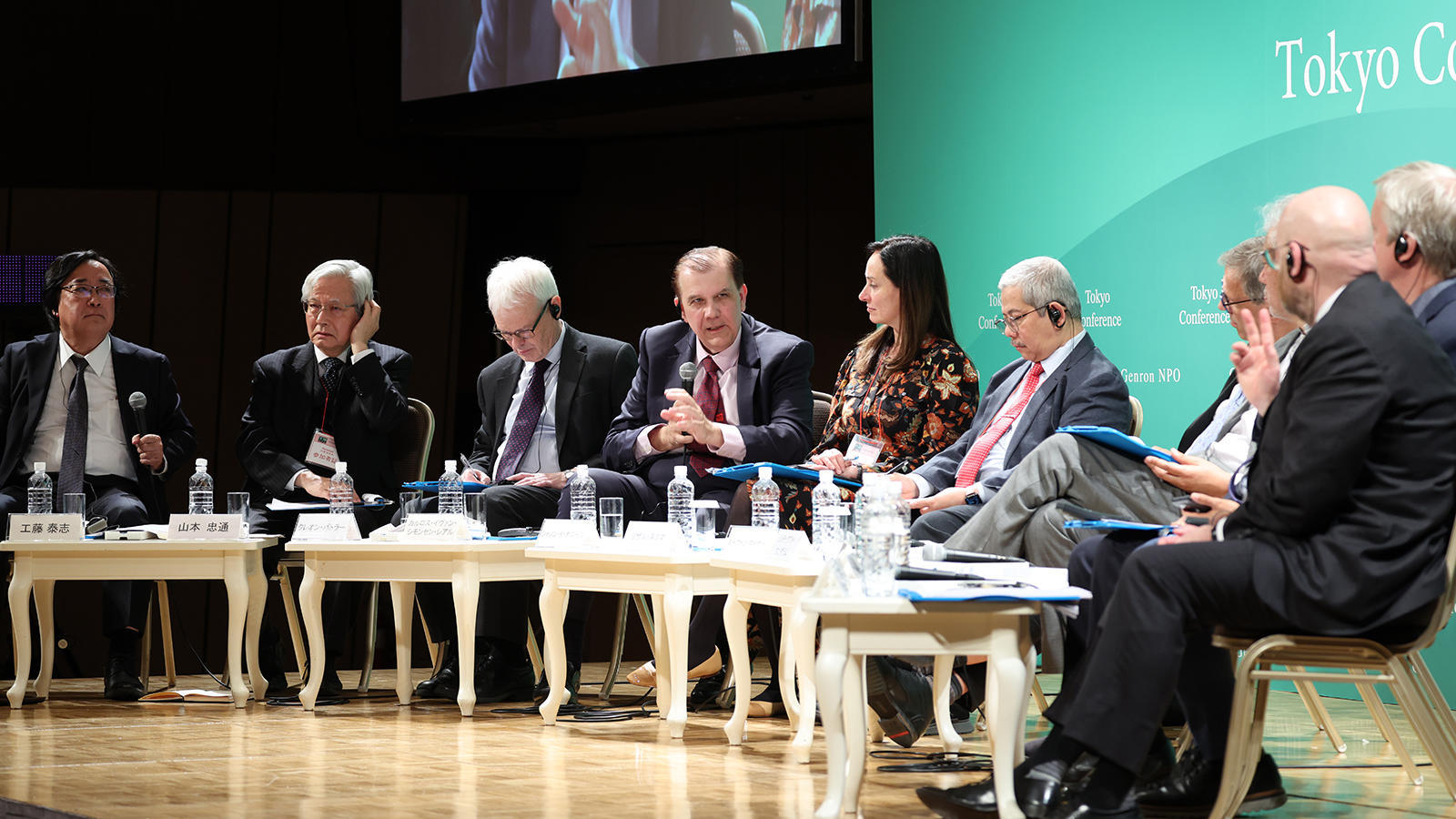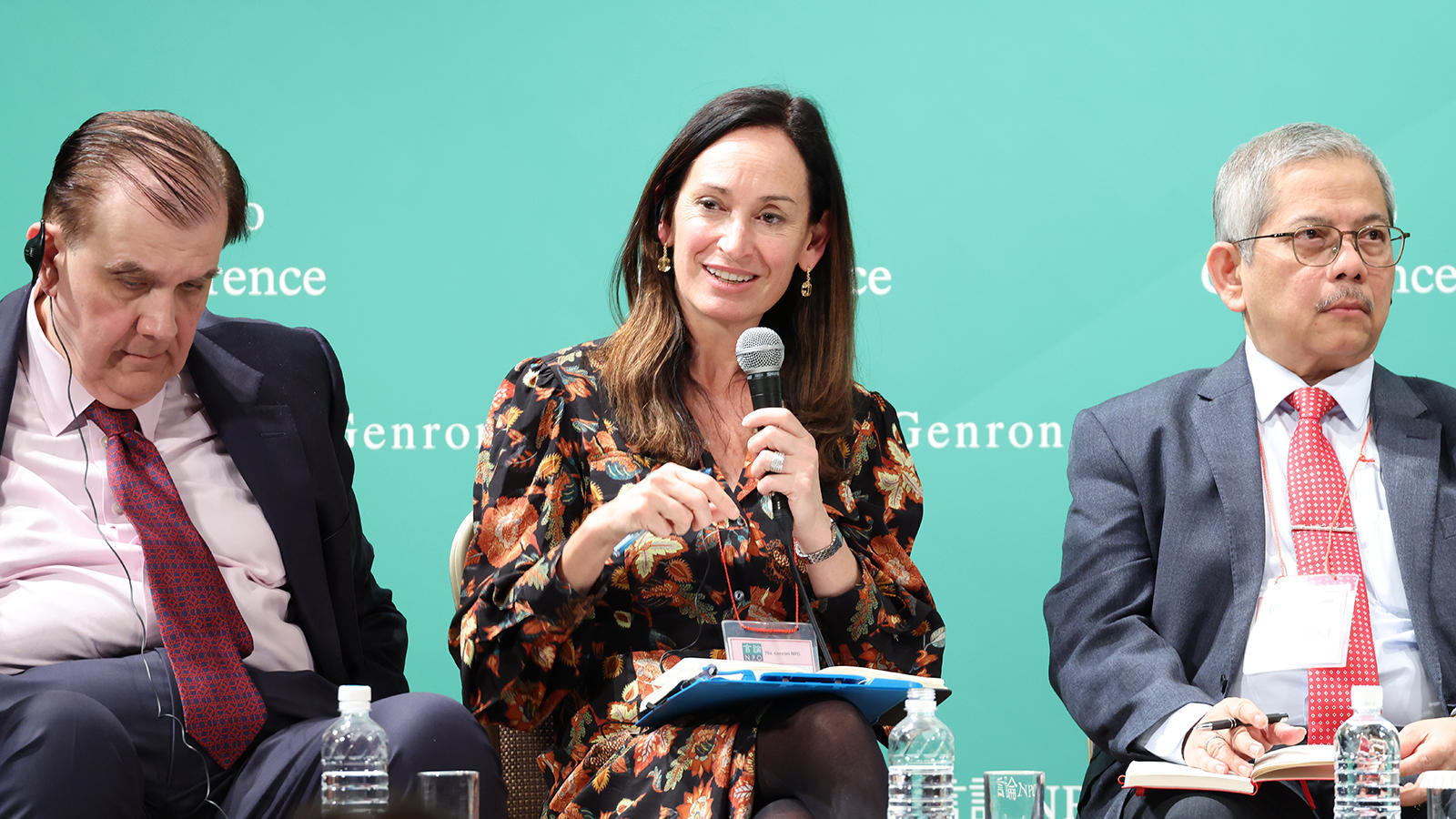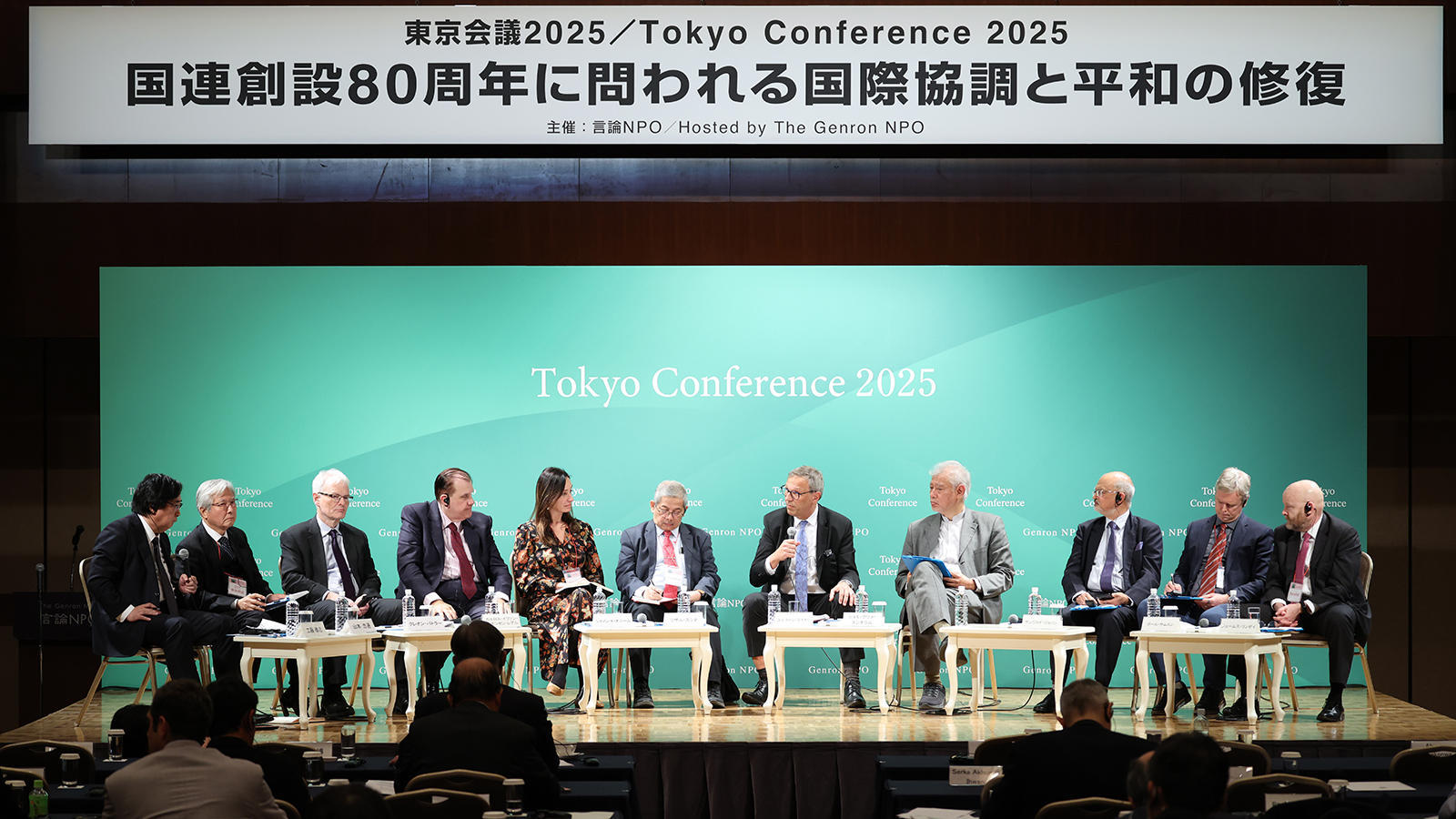James Lindsay is a Distinguished Senior Fellow in U.S. Foreign Policy and Director of Fellowship Affairs at the Council on Foreign Relations (CFR) in the US, and he opened the Session 1 discussion at the Open Forum.
"It's important to understand that US foreign policy is changing in a fundamental way and it's not going to change back any time soon," he began. "Trump has made it clear for decades that he rejects the world order that the United States created out of the ashes of WWII, and would reject the premise of this conference about the importance of multinational organizations and multilateral cooperation."
Lindsay went on to explain the difference between Trump's first and second administrations.
"This time around, Trump knows how to be president. He also has advisers who will enable him to act on his impulses rather than constrain them," he explained, before warning the gathering that the situation may deteriorate even further.
"This disruption will continue and it may even escalate. President Trump sees the world not as a place where you get ahead by cooperation or talking about win-win solutions. He has a 'dog-eat-dog' view of the world, where the strong do what they will and the weak suffer as they must. He is not bound by sentimentality. He is not bound by agreements. I've lived in Texas. Let me put it in a 'western' metaphor. Don't expect the sheriff to come riding into town to save the day or save the town's folk. It's going to be up to the townsfolk to save this order that they see great value in."
Stefan Mair, Director of the Stiftung Wissenschaft und Politik (German Institute for International and Security Affairs) agreed with Lindsay's assessment.
"I think we have to be prepared for the whole thing to escalate further. I think we have to realize that we are on our own, that we have to take responsibility for our own security. I don't see us as being in a hostile relationship (with the United States)," he said, before suggesting that Europe's current stance toward China may be one that will be effective with the US as well.
"We talked about China being a rival and a competitor and a partner to us, and perhaps we have to apply the same approach increasingly to the United States. We will be rivals on many issues, especially, of course, on trade and probably also on technology. We will compete on several issues, and we still have good reasons to be partners on several issues. The question is really whether this kind of partnership we still offer to the United States will be taken up by the Trump administration."
Mair also expressed his hope that the US will understand that the EU must take steps to protect itself.
"All the European leaders have been quite clear that we still consider the United States to be an essential partner, but we have to take responsibility for our own security."
Session moderator Yasushi Kudo (President of the Genron NPO) asked Mair how Germany feels about the US recently failing to fulfill its commitments to multilateral cooperation.
"How should the (other) Western countries respond without the United States? Do you we take on the burden that the US used to shoulder?" Kudo asked.
Mair answered, "I think we have to accept that the United States will not be available for at least the next three years for any kind of reform of multilateralism or any kind of multilateral action, and it can't be replaced by any other country. China is perhaps the only one that has the potential to replace it, but I think it is unwilling to do so, and we aren't really wishing that it will. I think it will be a variety of countries, most of them represented here on the panel, who have to take responsibility to engage in this."
Addressing issues without the US not a realistic approach
Paul Samson is President of the Centre for International Governance Innovation in Canada, which will host the G6 leaders' summit this June, and he spoke about what could be expected from this year's summit.
"I think the expectation should be that it will be a difficult meeting. However, there may be an opportunity for some common issues to be identified where the G7 can be useful. Perhaps even an expanded G7. I think that would be an interesting question. Defining what that interest is, I think, is going to be difficult. It probably could be around some issues like technology cooperation, digital platforms were mentioned earlier, the emergence of quantum technologies...these kinds of issues are very much common interests across the G7 as they relate to security."
Samson was asked whether the current rift will impact the G7's maintenance of the global economic system, which it has done through economic cooperation between the G7 members, and Samson did not rule out the possibility that there will be an impact.
"Something like foreign exchange rates, the financial sector, without the United States at the table, it's not easy for the others to advance the issues. But they may have to do so if there is a complete vacuum," he said.
Chatham House Global Economy and Finance Programme head Creon Butler said, "I think we have to take what President Trump says on its face value. It could turn back after a couple of years or four years, but I don't think it will ever go back to what it was before."
Butler went on to clarify the potential UK reaction to the imposition of tariffs by the US.
"In our responses to the US, we're actually going to follow the key norms that the WTO has. We're going to preserve MFN (most-favored-nation) treatment in the way we respond to tariffs that the US may put on us. We will follow WTO rules. We will file WTO disputes and so on...I doubt that the US will step out of the WTO, partly because it's a way of continuing to influence the way it operates."
What do the BRICS countries think about Trump 2.0?
Xu Bu, former Director of the China Institute of International Studies, attending the session remotely, lamented the current situation, saying, "When we are commemorating the 80th anniversary of the end of WWII and the founding of the United Nations, it's really painful for the international community to witness the leading country, the only superpower, retreating from international institutions, the principles, and rules which it once promoted and upheld."
He called on nations to be patient in dealing with the various issues the world faces today, before being addressed by Kudo, who said, "Under the first Trump administration, President XI Jinping said at DAVOS that China was going to be a leader in the free market. But this time, China appears to be quiet. Why is that?"
"I don't think China is being quiet," Xu answered. "Instead, China has been promoting peace in Europe. China has been upholding international norms and regulations regarding trade and regarding financial cooperation. We strongly support the WTO being at the center of dealing with economic and trade issues. Unfortunately, tariffs are being weaponized and the world economic and trade situation is becoming more fragile. That is really the big threat. Not only for the developing countries, but for developed countries."
Sunjoy Joshi is Chairman of India's Observer Research Foundation, and he provided another perspective from a BRICS nation.
"There's no doubt about who is going to be leading in the Trump era. The US is not going to give up its leadership. It has no intention. Trump is very clear about that. He is the undisputed leader of the world," he said. "I like Mr. Lindsay's analogy of the Wild West about there being no sheriff in town. Sorry, but there is a new sheriff in town. He rides a very high horse. He has a very loud whistle. He insists that everyone in the town needs to shed fat, put on some muscle, and start policing their own area."
"That generally seems to be the message: 'This is how you're going to do it. Don't come running to me. You had better start paying me for all that has been done. There's a price for what I do.' This is a form of international cooperation. This is the 'New World Order.' This is Trump's version of the new order which is going to come into play," Joshi said.
At the same time, Joshi believes that there are many agreements that are now under threat, from digital taxation to climate change, and that cooperation will become more plurilateral in form rather than disappear outright.
"There are going to be intense negotiations between parties with the US, and amongst themselves, and how those negotiations play out is something that must be watched extremely carefully over time," he warned.
Carlos Ivan Simonsen Real, President of Brazil's Fundacao Getulio Vargas (Getulio Vargas Foundation) brought up the international foreign exchange reserves held by different countries, and concluded, "Clearly the Euro area is not paying enough to the Americans. From an American point of view, I would say that. If I were an American, I would see this huge current account deficit. It's not only the fault of China; it's the fault of the rest of the world. The point is that the Americans cannot sustain such a current account deficit forever. On the other hand, the main problem in Europe is the dependency of the Euro on the current account surplus of Germany, but that...is in dollars."

No need to question US involvement - More important to integrate "non-G7 voices" and build a global architecture
Rizal Sukma is a Senior Fellow at the Centre for Strategic and International Studies in Indonesia, one of ASEAN's most influential members. He addressed how multilateral efforts may change in the future.
"Multilateralism is still very important, but I don't think that we should continue with this assumption that international cooperation only happens if the US is engaged. We need to go beyond that. It depends on the nature of the challenges we face. Not all issues need to be resolved through cooperation between 100 nations. You need to go to other multilateral forums. The framework of cooperation varies from one region to another," he said.
He also argued that people should re-think how the current discussion is being presented.
"I have the sense that the whole discussion is framed within the need to juxtapose BRICS on one hand and the G7 on the other. I don't think that's helpful. We need to think about how we can integrate all of those non-G7 voices out there, especially among the emerging economies, into the architecture of cooperation at the global level and also at the regional level."
Japan's Tadamichi Yamamoto formerly served as the UN Secretary-General's Special Representative for Afghanistan, and he provided a perspective of the arguments against multilateralism being made by US President Donald Trump.
"(The G7 has) been relying upon the generosity or the benevolence of the United States for security. The US has been helping many countries' economic growth with an enormous trade deficit, accepting goods and other things into their country. The US has been generous and has been carrying the responsibility of managing this current free democratic international framework. Even in the United Nations, the US has been the biggest beneficiary of the UN system, and has used it really well for its own foreign policy purposes. This is the Pax Americana. What (Trump) is saying is that the Pax Americana is no longer viable. It may be possible, but it must be redefined," Yamamoto said. "The G7 - or the G6 - will have an enormous responsibility to come up with solutions that will be sustainable."
CFR Vice-President Shannon K O'Neil vice president provided an answer to the question: How do we protect and sustain multilateralism?
"I would say there are two paths forward," she said. "One is to at least preserve the big multilateral institutions - the UN, the WTO - and make sure they don't disappear. But if you want to move forward and find some sort of solution or improvement on the many of the issues that face the world, I would say it's smaller groups of countries - or others...businesspeople, civil society organizations, cities, other levels of government - that come together. They come together in what are often called plurilateral institutions or 'minilateral' institutions. These can be regional, or 'coalitions of the willing' around particular issues, zeroing in on issues that have a global impact: things like climate change, global health, financial stability, commercial relations, and the like."

New non-aligned movement committed to pacifism needed
Jomo Kwame Sundaram, former Assistant Secretary-General for Economic Development of UNDESA, was speaking about the US and its relationships with other countries when he quoted late US Secretary of State Henry Kissinger, who once said, "it may be dangerous to be America's enemy, but to be America's friend is fatal."
"I think we have to think realistically," he continued. "It forces us to be more realistic about the motivations and shed some of our prejudices. I would recommend a third force, which I would call... the 'second non-aligned movement,' a movement that is not aligned with the US or the West, or with China and the Russian Federation. We need a non-aligned movement which is committed to pacificism and committed to development."
Simonsen Leal noted having some concern about the depth and breadth of the US' current diplomatic strategy.
"I see one thing that worries me a little bit. I don't know how profound is the strategic scope of American diplomacy these days. On the other hand, Russia's is very profound. It still has nuclear weapons, and it has a doctrine," Simonsen Leal said.
O'Neil added to that when she said, "I do see a very strategic plan on foreign policy coming out of China. There's a very strategic plan at home...and across a whole host of areas, in particular, on the economy."
Kudo brought the Session 1 discussion to a close with a broad overview of some of the major points made.
"When dealing with global-scale challenges, we must raise the level of global governance (to meet those challenges.) We touched briefly upon what the necessary direction for cooperation, and what sort of multilateral effort is needed to ensure cooperation happens. I think there was some potential in what we heard today."

Post a comment